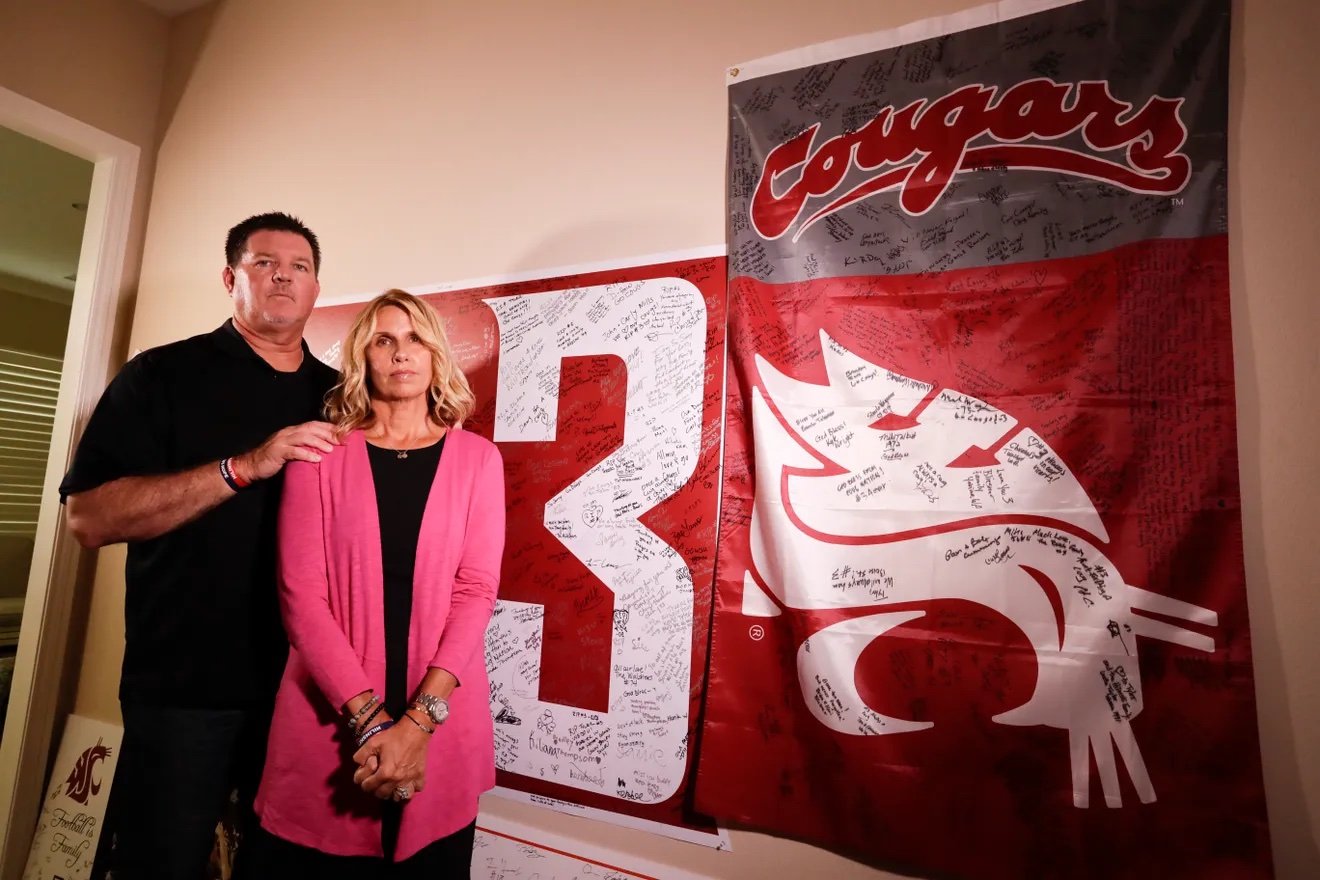Former quarterback’s parents determined to keep other athletes from their son’s fate
The Gainesville Sun
This Thursday morning at PK Yonge’s auditorium, Kym and Mark Hilinski will swallow hard and give a “Tyler Talk”.
It will be worth a listen.
Tyler Hilinski was a quarterback at Washington State. A kid who seemingly had a great life going.
Then he went into a closet at his apartment, picked up a rifle and shot himself in the head.
Since that January day in 2018, his parents have made it their life’s mission to keep the next Tyler from pulling a trigger. Each time they get onstage, it’s like a clawing at an open wound.
“It will never be easy or get easier,” Kym Hilinski said. “It’s just that there are days where you can handle the pain a little bit better.”
Thursday will be the 250th or so Tyler Talks. The Hilinskis have sort of lost count. This one will be sponsored by Florida Rising Stars Foundation, a nonprofit that promotes sports-related careers for youth.
One career is mental health support at schools. There wasn’t much of it for Tyler.
That might have saved him, or maybe not. Such is the brutal mystery his parents endure.
“There’s not a day that goes by that we don’t ask ourselves why?” Kym said.
Tyler was the middle of three boys, all of whom were or are college quarterbacks. Teammates had carried him off the field after he came off the bench and led the squad to a 21-point comeback win over Boise State.
He loved playing for Mike Leach and was expected to become the full-time starter in 2018. Then three weeks after the Holiday Bowl, Tyler didn’t show up for a weightlifting session.
A couple of teammates went to his apartment and found his body. He’d left a note, though it didn’t offer any real insight into his motives.
“It’s really only breadcrumbs that we’ve discovered,” Kym said.
Two days before he died, Tyler changed his phone's password to 767799. His parents eventually figured out the keypad numbers spelled out a word.
S-O-R-R-Y-Y.
That didn’t begin to explain the anguish that drove him to that closet. An autopsy revealed he had CTE, a degenerative brain condition linked to concussions.
But Tyler hadn’t been depressed or withdrawn or waved any other red flags. Whatever he was going through, Tyler bottled it tightly inside.
That’s a perpetual feature about suicide. The stigma is that only crazy people do it, and nobody wants to admit to such weakness.
It’s especially true with athletes, who are conditioned to be stoic, to gut things out. At least the fear of appearing weak is lessening. Luminaries like Michael Phelps, Kevin Love and Simone Biles have opened up about their mental health struggles.
“That stigma is being beaten down a little bit,” Mark Hilinski said. “I do think it’s going to take a while to get it completely gone. I don’t know if it will.”
Almost 14 Americans a day committed suicide in 2022, the most recent year the CDC has information on. Five NCAA athletes killed themselves in April of that year.
That was unusually high, but it illuminated a huge flaw in the system. When Tyler committed suicide, Washington State had scores of coaches, analysts and trainers to bring out the best in its 500-plus athletes.
It had one part-time mental health counselor. More support might have saved Tyler. Nobody will ever truly know.
“There are plenty of places in the story where all he had to do was raise his hand,” Mark said. “He was unable to do that.”
Florida has a mental health committee that includes seven licensed providers. Athletic department staff members are trained to hopefully recognize red flags.
Raising such awareness is one of the goals of Hilinski’s Hope, the nonprofit Mark and Kym founded. They’ve developed a 100-plus page “Gameplan” treatment program they share with schools, leagues, businesses and any entity that shows interest.
At the heart of it all are the Tyler Talks. After six years, Kym and Mark still choke back tears as they relive their son’s story. For them, persuading kids that it’s okay to seek help keeps Tyler alive in a meaningful way.
“They think that not reaching out for help is strong,” Mark said. “In fact, it takes strength to reach out and say, ‘Hey, I’m struggling.’”
If the talk at PK Yonge follows form, a few people will slide up to Mark or Kym afterward and whisper words of gratitude. Some will even say the talk might have saved their lives.
That’s the hope that keeps the Hilinskis going. The payoff for a pain that will never go away.

